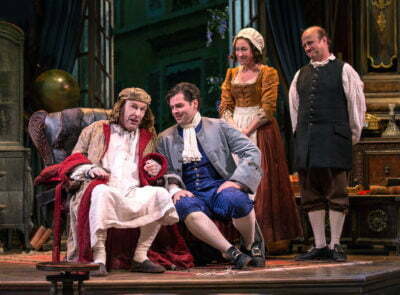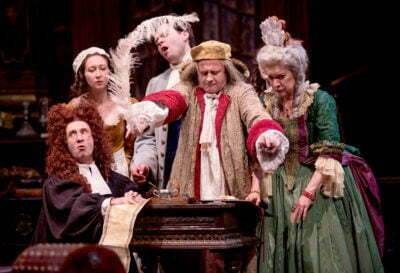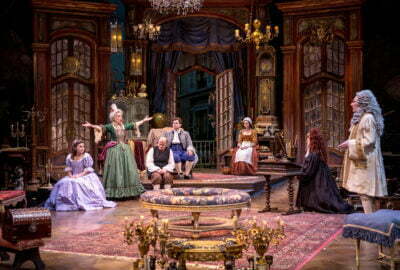The Heir Apparent
 By David Ives
By David Ives
Adapted from Jean-François Regnard
Directed by John Rando
Produced by Chicago Shakespeare Theater
Louis XIV Dances on His Throne
It can be hard to know sometimes, when looking at an old, long-forgotten script, whether to admire it as a forgotten treasure, or to accept the judgment of history, and leave it on the dust pile. That is particularly true with scripts that are right on the borderline, which would need an excellent acting company and some revisions in order to be salvaged. So it is with The Heir Apparent, a 1708 comedy by Jean-François Regnard, one of the French neo-classicists who was completely overshadowed by Molière, but now has been plucked for a new English-language update by “transladaptor” David Ives, who has previously worked on other plays of the same era. This stock-character and situation piece, which is heavily inspired by commedia dell-arte, is almost entirely dependent on scatological humor, and strains too hard for a laugh a few times. But under the direction of the acclaimed John Rando (famous for the Broadway debut of Urinetown), the cast, and especially Paxton Whitehead as the old fart Geronte, polish The Heir Apparent until it glimmers for all its worth, with rewarding results.

Upon lights up, the first sound we are greeted with in Kevin Depinet’s dilapidated, but beautiful turquoise and bronze salon, is a long, wet shart. The unfortunate maid, Lisette (Jessie Fisher), empties out a chamber pot, and is greeted by the profligate young Eraste (Nate Burger), nephew of her employer, Geronte. The old man is dying from diarrhea which, in his words, he has produced enough of to span from Calais to Crimea, yet he stubbornly insists on remaining alive. This is very bad for Eraste, who is on the brink of being jailed for debt, and needs to inherit Geronte’s million francs right away. He also needs to obtain the money for Madame Argante (Linda Kimbrough) to allow him to marry her daughter, Isabelle (Emily Peterson), and in turn, for Eraste’s servant, Crispin (Cliff Saunders), to marry Lisette. There shouldn’t be too big a problem, as long as Geronte can be persuaded to finally sign his will; then everything will be guaranteed. However, Geronte shocks and disgusts our heroes by announcing that he intends to marry Isabelle himself, that very day. Madame Argante agrees, since it’s another way to get the money into her family, and Isabelle sees little other choice, unless somebody can think of a scheme quickly. It’s up to clever Crispin to create the disguises and manipulations they will need to fool Geronte’s tiny lawyer, Scruple (Patrick Kerr), and revise the will in Eraste’s favor.

In true neoclassical style, Ives translates the play into rhyming couplets, which the actors deliver so naturalistically that the poetry at times becomes invisible. But then, Ives pulls out a rhyme that is usually as clever as it is revolting and groan-worthy, and we marvel at his creativity. Another feature of plays from this era is that they often had very specific references; The Comédie-Française was the only company allowed to present comedies within the Paris city limits when Regnard was writing, and had a very close-knit audience. Rather than struggle with antiquated wit, Ives has swapped in shamelessly anachronistic turns of phrase, beginning with Eraste comparing Madame Argante to Godzilla. They become an inescapable part of the play’s atmosphere, and are usually more than funny enough to balance out the logical problems they introduce (this isn’t a play you should think too much about).

There are times, mostly when Whitehead is not present, when the play loses its spark. The other actors are all fine; Nate Burger and Jessie Fisher are shrewd and charming scoundrels, Patrick Kerr is the fuming butt of every short joke, and Cliff Saunders has a Borscht Belt persona which allows him to easily slip into mimicking Geronte’s long-winded descriptions of his gastrointestinal distress while in disguise. The trouble is that Ives sometimes allows the actors to abandon language entirely, and just make loud noises and directly appeal to the audience for applause. Some of the early filler zaniness involving disguises is overwrought, and even in an exaggerated world, characters can’t assault each other to prevent them from seeing something that would reveal a deception, and then go back to ordinary befuddlement. However, Whitehead, with his raspy, resonating voice and ability to inhabit either profound dignity or utter debasement, ties the whole play together into an amusing whole. And since Regnard was writing at the beginning of the Age of Sentiment, after a cleansing, the characters are permitted to move on to a healthier bourgeois future, and everyone feels warm inside for the rest of the evening. If you’re on the level of sophistication where you desire to see Volpone from a switched perspective and with a lot more poop jokes, The Heir Apparent is the show for you.
Recommended
Jacob Davis
[email protected]
Reviewed December 8, 2015
This show has been Jeff recommended.
For more information, see The Heir Apparent’s page on Theatre in Chicago.
Playing at Chicago Shakespeare Theater, 800 E Grand Ave, Chicago. Tickets are $48-88; with discounts for groups and patrons under 35; to order, call 312-595-5600 or visit chicagoshakes.com. Playing through January 17, 2016. Running time is two hours and fifteen minutes, with one intermission.
